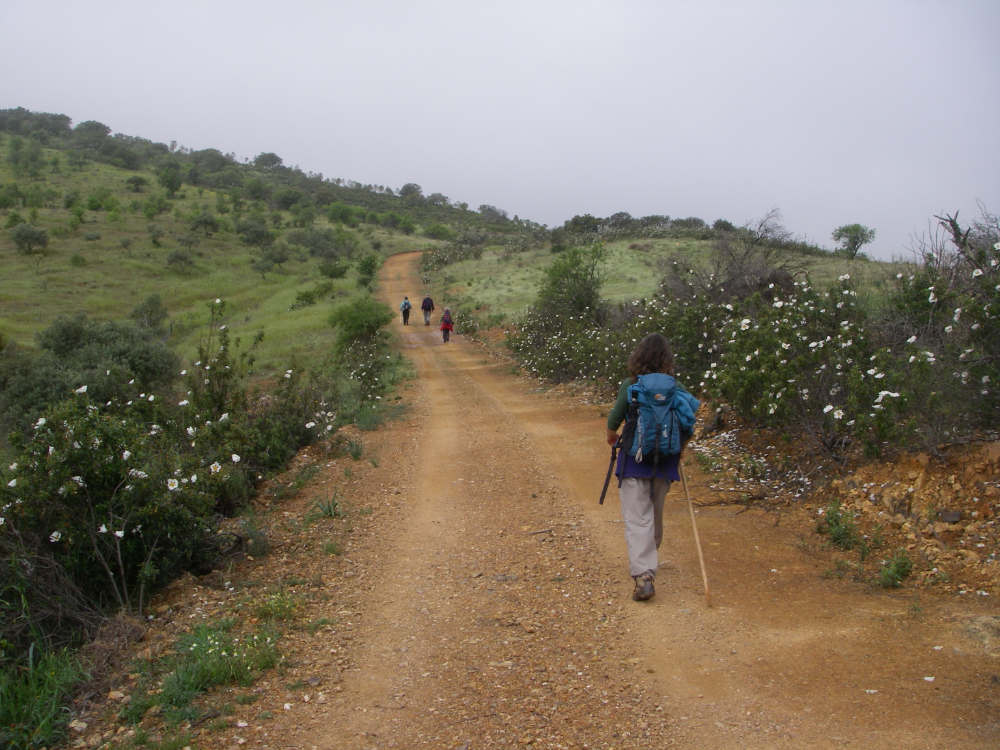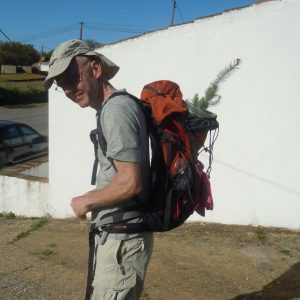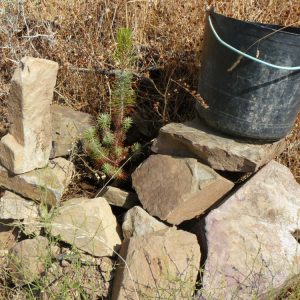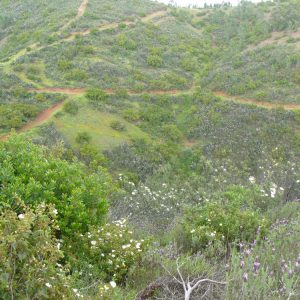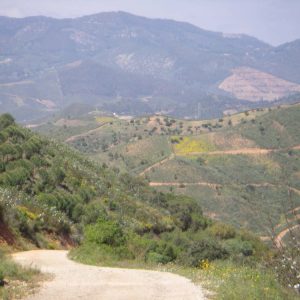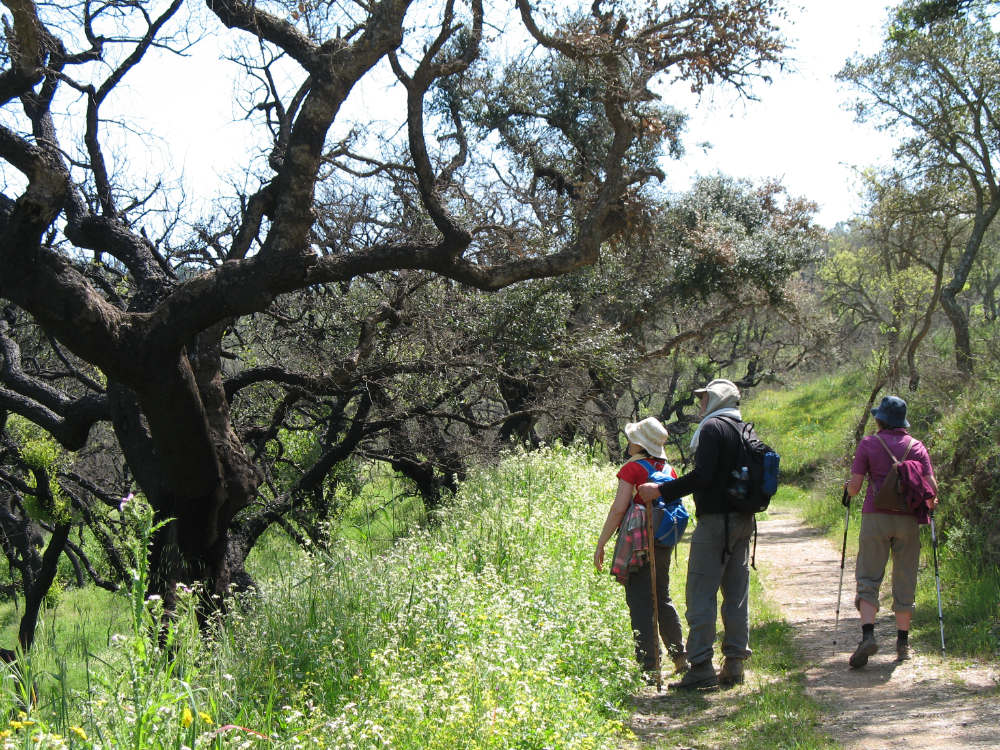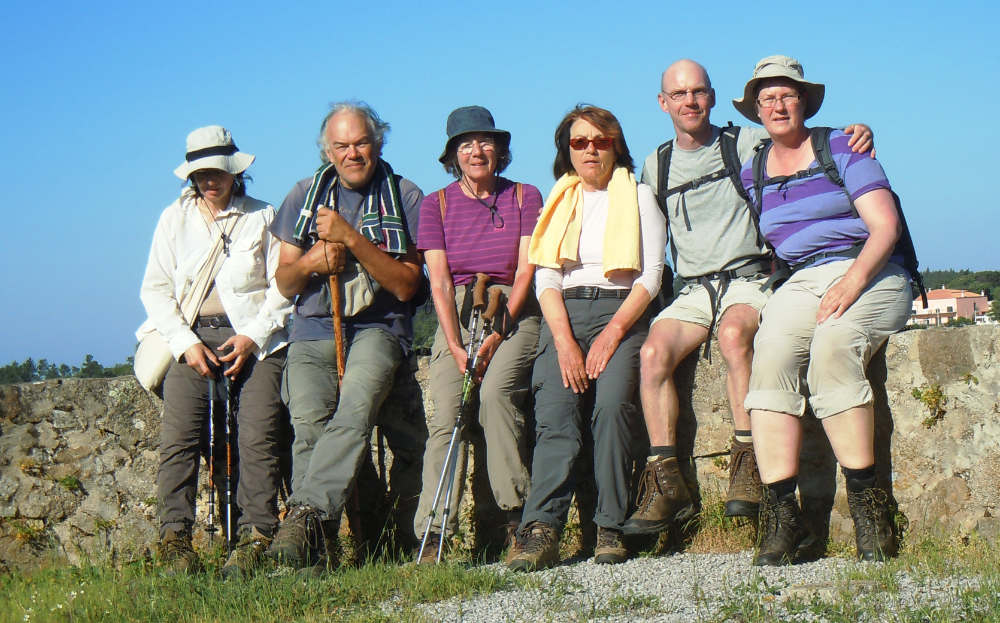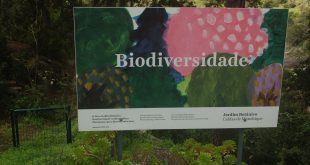Saturday 26th June 2021
One of the things we do here at ECO123 is to come up with ideas for tomorrow’s democracy. My Via-Algarviana represents in fact another project to protect the climate. To start with, walking is climate neutral. This now is a challenge to see whether we can join forces to achieve something positive that people will still talk about in 100 years’ time. This is about our nature and whether we are able to give her something good of ourselves – instead of always just taking from her.
It’s a special skill, to inspire, sensitise and motivate people, and young people in particular, for the conservation, the protection and recovery of nature, for a peace mission at local level, for the planting of trees of very different species, their care, their irrigation, supervising their growth and their upkeep. To achieve climate neutrality also means planting many different trees in the right places. To give something of yourself. Demonstrations for an intact environment? Fridays for Future? Indeed, but how about connecting this to something tangible that you can identify with. D’you know something? This can actually be done! Why not plant a few trees every Friday, and look after them? Be proud that each and every one of us is able to do something very real for the climate. Where the planting of trees is concerned, the first five years is always the most important. Once trees have survived this period of time, their growth and well-being are easier to maintain. Planting trees, caring for them and protecting them. Every Friday. Fridays for Future. Outside our own front door.
What can we do in our capacity as those who initiated this project? A nearby school applies for this pilot project. We can talk to the form teacher at the school, explain the concept and discuss it. Talk about the idea in class and with the students, initiate a workshop, then head out into the forest and complete the tuition there. There we can study nature and its diversity, using the real-life object, observe how the flora and fauna interact and support each other, watching the tree we planted grow. The idea is to fill the concept of biodiversity with life. To dare democracy.To come together in planting a forest. To enjoy a good experience. No ifs and buts, no whining or excuses, no, all we’ll accept here is a resounding positive YES.
The first project is planned for the area between Barranco do Velho and Cortelha along the GR13/Via Algarviana, and needs detailed definition: to plant a young tree (including fruit trees) every five metres, on both sides of the long-distance trail connecting Alcoutim with the southwestern cape. So to plant new saplings, alternating along both sides, invite our landscape architect, the teachers and schoolkids, and group them together in a team that will take on full responsibility for this section of the trail. The Via Algarviana is Portugal’s oldest footpath, in existence since the 4th century AD and traditionally the old Vicentine pilgrim path undertaken from Valencia …
My hope is that the mayor will make a speech in front of everybody taking part, and that he will cut the green ribbon of this pilot project, a first in Portugal and Europe. I would be happy if we could use his words to lend powerful support to the idea and the plan to plant trees alongside the path, on the right and left hand side, for three kilometres. These are the first three of 300 kilometres. Let’s gain some experience and consider asking students from the UALG to accompany us? Writing their master thesis on this would well be worth a book. I can see this in my mind’s eye already: creating three work groups, made up of pupils and adults. I’d like to convince major companies and corporations operating here in the Algarve to take part, to sponsor the Via Algarviana. This is a project spanning five years: I could think of partnering up with Águas do Algarve SA., for example, who could provide the water for the irritation of the saplings; the Salir firefighters would supervise the emergence of the new avenue in situ, in hot summers prone to forest fires in particular – and the municipality would build a cistern at one-kilometre intervals to store water. The project could be divided up into three sections. In sections of a hundred metres each, small working parties of pupils take on the planting, care – and the responsibility so the trees won’t want for anything. Every helper invested with responsibility for a section should name two stand-ins if somebody falls ill or cannot make it on a given Friday. This is about working professionally with no need for inventing excuses, from the start.
Are there any motivational courses and rewards for friends of the climate, both in the schools and at City Hall? Let’s get the press, radio and TV involved and enlist their help. It would be good if the Almargem association could become the patron of this reforestation. Those who hike the Via Algarviana suffer with the heat and rising temperatures and stumble on the bad, stony and dusty footpaths. Sometimes they have to share the trail with cars and motocross machines. Are they allowed to be there? Across the entire distance there is hardly any forest to provide shade for a hiker, just a tree here and there that has survived the latest forest fire. And how about setting up the odd table and a couple of benches to unwrap a sandwich during a rest stop to accompany a nice view over the Algarve? In other European countries hiking trails are subject to ratings. Today, in the state it’s currently in the Via Algarviana would get a very bad score. This is something we can change, while raising the obvious question of how to pay for this. If every one of us were to donate five euros per year to this project we could raise a million via crowdfunding with the PPL initiative, and this would be the biggest success such a small-but-perfectly-formed project had ever achieved in Portugal. Maybe even our First Citizen might take part, donate a monthly salary to climate protection, don the hiking shoes and help plant a tree.
Dear Marcelo, come and join the team.
So, the current state of the Via Algarviana long-distance trail could be a lot better. This is an understatement. There is a lack of accommodation at the end of the hiking day. One such accommodation has just closed down in Furnazinhas. And this is a major problem. If you can’t overnight in this village you can’t really complete the full Via Algarviana. Many hikers from abroad have already noticed this. Who will be the innkeeper at Balurcos de Baixo in a few years? In Marmelete hikers sleep in the old people’s home. There are holes in the accommodation system, as well as where the food options along the route are concerned. Portugal boasts one of the best cuisines in Europe. Let’s prove that to the hiking folks for once.
So the beautiful Casa do Lavrador in Furnazinhas has been closed since June 2020 and is now up for sale. João Henriques, the innkeeper, will soon turn 77. The country needs young people. I’d like to use this as the opportunity to launch a rallying cry: Come on, come out here to the countryside and take on this “alojamento local”. Shall we leave all the chatter about pandemics and restrictions behind us for a moment? The village does not (yet) have alternative accommodation. The Via Algarviana is a magical long-distance trail. Having been set up with many financial resources, it should have been equipped with a better signposting system. At the start, the EU subsidised it to the tune of 270,000 euros, with ten communities contributing an additional 10,000 euros each. Money can sometimes be a valuable resource. The Via Algarviana’s bad shape is something we can tackle at any time. Forest fires too have damaged the route badly. In actual fact such a tour in the Monchique area harbours a high risk of ending up in the next forest fire of this kind. This is a part responsibility of the Almargem association. Together with the ICNF all should join forces to seriously consider how we can get rid of the monocultures again, fast. Conservation can do without a false compromise! To make good policies also means to be able to shape them.
How can political participation be made more inclusive? Which potentials are offered by new forms of participation for young people? To take on responsibility, to inspire people is a high art that only a few really master. To plant a tree, spacing them five metres apart means planting some 1,200 trees along three kilometres. However, after planting a tree, the most important task consists in caring for and looking after it. Let’s try it, let’s tackle this challenge together, and then turn the entire 300 km green with a national tree project. Força Portugal! – there are more important things in life than to always be cheering on (or to cry over) some football match…
 Eco123 Revista da Economia e Ecologia
Eco123 Revista da Economia e Ecologia

